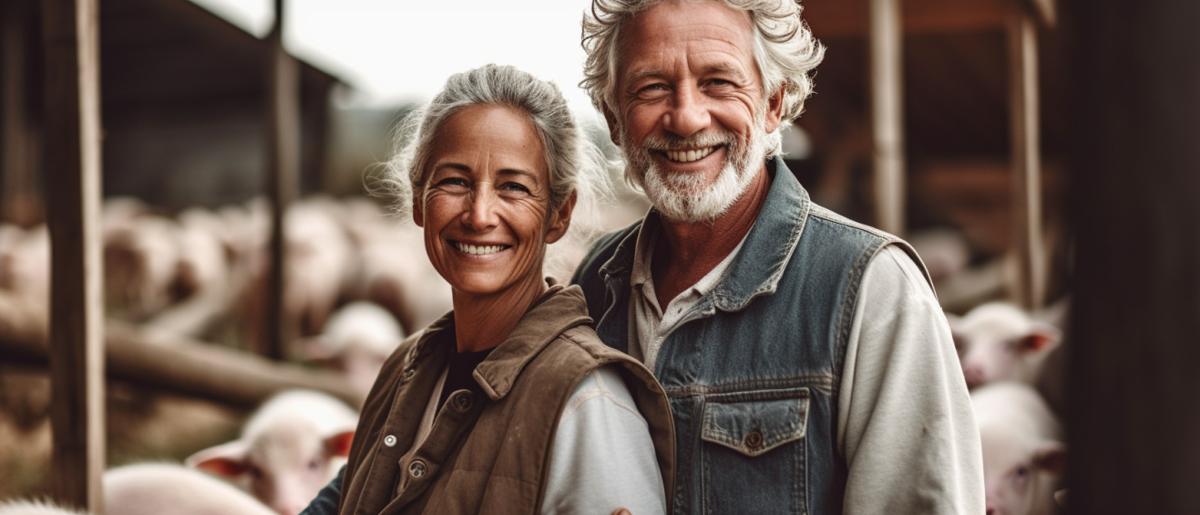

Australia's ever-flourishing agricultural sector relies significantly on its pig farming businesses. Ensuring the sustained proliferation and robustness of these enterprises often involves grappling with significant costs, from workforce sustainability to equipment upgrades, agricultural enhancement to disease control. In such a scenario, business loans surface as an invaluable financial aid. A business loan can act as a lifeline for many pig farmers, providing the necessary resources to tackle various operational challenges at different stages of the business cycle. The current Australian lending landscape offers a range of business loans tailored to cater to the distinctive needs of pig farmers, making it easier for them to navigate through tough farming seasons, invest in advanced farming equipment, or expand their farming operations. The assistance of a financial boost can be the key to the survival, growth, and success of pig farming businesses in Australia. The following sections unfold how business loans are becoming significant for pig farmers, the various business loan types available, and the top ways these loans are being utilised in the pig farming industry.
Compare over 50+ lenders with one application.
Pig farming holds a significant position in Australia's agrarian landscape, contributing notably to the nation's economy. It brings to the table a range of benefits encompassing economic, social, and supply chain aspects. From an economic perspective, the pig farming sector represents a substantial segment of Australia's lively agricultural industry. It helps fuel growth, generating employment opportunities in rural regions and beyond. Local pig farming is crucial to sustaining regional economies where these farms reside, enabling local spending and economic turnover. On a social scale, pig farming fosters community growth. It propels the vitality of a region by paving the way for small and medium-sized enterprises to flourish. It's not just the direct employment within the farming operations but extends to the ancillary services like transport, veterinary assistance, feed supply, and farm equipment. In the realm of supply chain sustainability, pig farmers reliably provide the nation with high-quality supply of locally produced pork. Australia's biosecurity measures paired with our pig farmers' commitment to best farming practises ensure the delivery of safe and quality produce. The traceability, transparency, and responsibility associated with local sourcing further strengthen food security among consumers. Thus, our pig farmers play a pivotal role in sustaining Australia's strong agricultural tradition, ensuring a stable economy, enabling community growth, and providing a dependable supply of quality food products. Their importance cannot be overstressed.
Learn about eligibility and how to apply.
Farming pigs in Australia is a demanding yet rewarding profession. However, it's not without its fair share of challenges. The pig farming industry has to contend with fierce competition, rising operating costs, and environmental concerns. In particular, market volatility can make it difficult for pig farmers to stay competitive and maintain profit margins. Prices fluctuate due to factors beyond their control, such as global supply and demand or feed costs, adding an extra layer of complexity to the business model. Further complexities arise in the form of regulatory hurdles. Governed by Australian biosecurity laws and animal welfare legislation, pig farmers must ensure that their farming practises meet stringent standards. Any failure to comply not only harms the welfare of the pigs but can also lead to hefty fines and damage to the farm's reputation. Meanwhile, environmental factors such as drought or disease outbreak can significantly affect pig production. When these difficulties strike, pig farmers often find themselves grappling with sudden output reductions and profit losses. Lastly, like any other business, pig farming also requires constant innovation and modernisation to sustain growth. Upgrading farming equipment, improving the breeding process, or exploring sustainable farming techniques requires significant capital investment - often an uphill task for small to medium-sized pig farmers. These daily challenges underline the crucial role that timely financial support, such as business loans, can play in nurturing the growth and sustainability of pig farming in Australia.
Calculate your repayment estimates and more.
In this dynamic and often unpredictable industry, a business loan can provide a stabilising force for pig farmers. Financial challenges stand as a significant hurdle in the field, ranging from the escalating feed and fuel costs to the need for expensive farm equipment upgrades. Business loans, with their flexibility and diversity, offer pig farmers an avenue to navigate these difficulties effectively. An essential benefit of such loans relates to the potential for growth and expansion. As a pig farmer, a business loan can facilitate the procurement of additional livestock or the development of current facilities. It could equally allow for the exploration of new technologies such as effective waste management systems or increased automation, positioning the business for future success. Lastly, business loans can act as a financial buffer during tough times. The pig farming industry is notoriously susceptible to market fluctuations, and unforeseen events can quickly cause a strain on resources. Having a business loan to rely on during these instances can prove invaluable, offering the reassurance of additional financial backing when it is most needed.
Enhance your pig farming endeavours in Australia with an array of business loan options. Equipment finance can help modernise your operations, while working capital loans assure cash flow consistency. Alternatively, agribusiness loans, designed specifically for farming, could be the perfect fit for your unique agricultural needs.
There are several types of business loans in Australia that can benefit Pig Farmers. Each of these loan types has its unique features, advantages, and potential disadvantages. Here are some of the most common types of business loans for Pig Farmers:
Secured Loans
These loans ask for some form of collateral, like land or machinery. They can offer lower interest rates and longer payment terms, making them a suitable option for pig farmers needing significant funds.
Unsecured Loans
Unsecured loans do not require collateral, making them a viable choice for pig farmers who may not have substantial assets to secure against the loan.
Equipment Financing
This specific type of loan is for purchasing necessary pig farming equipment such as feeding systems or farm vehicles. The equipment itself serves as collateral for the loan.
Line of Credit
A revolving line of credit allows pig farmers to access funds as needed. It can cover operational costs, making it an excellent option for handling the variability of farming incomes.
Invoice Financing
For pig farmers who sell goods to businesses, invoice financing advances a percentage of outstanding invoices. It can help manage the cash flow if clients are slow to pay.
Overdraft Services
Overdraft services extend the available balance of your business account for a short period, providing a cushion for unexpected expenses in pig farming.
Merchant Cash Advances
MCAs provide a lump sum advance to businesses with regular credit/debit card sales, such as pig farmers offering direct sales to customers.
Commercial Property Loans
These loans are specifically for purchasing or developing land for pig farming. The property itself secures the loan.
Trade Finance
Trade finance can help pig farmers manage their supply chain, enabling them to purchase feed and other essential supplies.
Agribusiness Loans
Loans designed specifically for the agriculture sector. They can accommodate the cyclical nature of pig farming, often providing more flexible repayment options.
Business loans can significantly bolster Australian pig farming operations. They could be used for a range of purposes like extensive farm upgrades, purchasing advanced livestock care merchandise, or introducing advanced tech-aided feeding systems. This streamlines operations, ensuring pig farmers stay competitive and profitable.
Here are some common reasons Pig Farmers use business loans:
Expansion of Farm Infrastructure
From constructing new pig houses to enhancing the quality of existing infrastructure, business loans can provide the necessary funding that may lead to greater efficiency and increased productivity.
Purchasing Livestock Feed
A fair chunk of expenses for pig farmers goes towards purchasing quality feed, ensuring a healthy livestock. A business loan can make these essential purchases possible, without putting strain on regular cash flow.
Investing in Farm Equipment
From pig handling equipment to farrowing crates, business loans can cover the cost of investment in advanced machinery and tools, leading to improved farming operations.
Vechicle Acquisition
Pig farming involves a lot of transport, whether it's for taking pigs to the market or bringing in resources. A business loan can support the acquisition of reliable vehicles to uphold smooth operations.
Implementing Biosecurity Measures
Implementing strict biosecurity on pig farms is crucial to prevent disease spread, and business loans can support instalation of specific biosecurity structures or equipment.
Paying for Veterinary Services
Regular health checkups, vaccinations, and disease management needs of pigs can be easily covered by the cash influx from a business loan.
Recruiting Skilled Labour
Hiring professional staff such as veterinarians, farm managers, or animal care specialists can be made possible through a business loan.
Setting up Waste Management Systems
Establishing a proper waste disposal or manure management system not only maintains cleanliness, but also adheres to environmental regulations. A business loan can fuel these initiatives.
Training and Skill Development Programs
Sending farm staff for training courses and skills development programmes can enhance the overall productivity of the farm operations, a cost that can be covered by a business loan.
Investing in Marketing and Branding
Building a brand image and reaching potential market areas is an integral part of any farm business. A business loan can fund these promotional activities, ensuring wider reach to potential customers.
To estimate your monthly repayments and the total cost of the loan, input the loan amount, loan term and interest rate into the calculator below. This helps you plan your budget and choose the most suitable loan terms.
These helpful FAQs will help you find the answers you need. If you can't find what you're looking for, you can request a callback below.